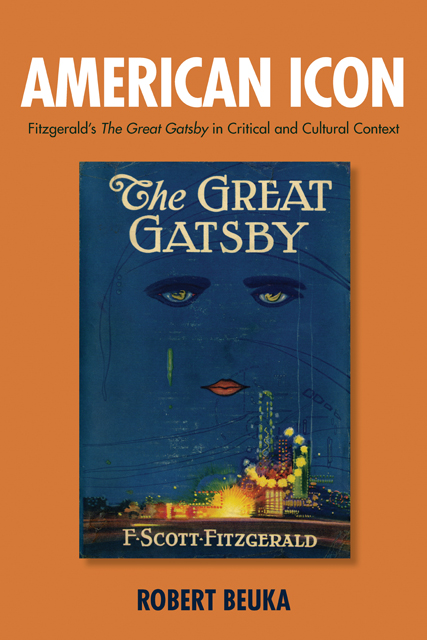Book contents
- Frontmatter
- Dedication
- Contents
- Preface
- 1 A Book of the Season Only: Early Reactions to The Great Gatsby
- 2 A Green Light: The “Fitzgerald Revival” and the Making of a Masterpiece, 1940–59
- 3 The Gatsby Industry: Tracing Patterns and Pushing Boundaries in the Criticism of the Sixties and Seventies
- 4 Gatsby, in Theory (and Out): New Paradigms in the Eighties and Nineties
- 5 Twenty-First-Century G: The Great Gatsby as Cultural Icon
- Works Cited
- Index
5 - Twenty-First-Century G: The Great Gatsby as Cultural Icon
Published online by Cambridge University Press: 11 February 2023
- Frontmatter
- Dedication
- Contents
- Preface
- 1 A Book of the Season Only: Early Reactions to The Great Gatsby
- 2 A Green Light: The “Fitzgerald Revival” and the Making of a Masterpiece, 1940–59
- 3 The Gatsby Industry: Tracing Patterns and Pushing Boundaries in the Criticism of the Sixties and Seventies
- 4 Gatsby, in Theory (and Out): New Paradigms in the Eighties and Nineties
- 5 Twenty-First-Century G: The Great Gatsby as Cultural Icon
- Works Cited
- Index
Summary
Performance (and) Anxiety: The Cultural Turn in Gatsby Scholarship
While it is surely too soon to make definitive statements about the trajectory of Gatsby criticism in the new millennium, certainly the industry is alive and well, as the volume of scholarly output continues unabated. While one could argue that the age of high theory has passed, the theoretically informed approaches of the 1980s and ’90s have impacted the shape of Gatsby criticism to this day. Of particular note is the sustained interest in the historicity of the text, and particularly how it responded to the discourses of its own moment — from pervasive notions about race, gender, and national identity discussed in the popular magazines to the imagery offered in popular music and entertainment. A brief look at some of the more interesting scholarly takes on Gatsby from the new millennium shows a concerted effort to examine the novel’s cultural relevance. Scholars are continuing to deepen the connection between the text and its own age, and in the process expanding our understanding of Fitzgerald’s historical consciousness.
One of the primary sources for much of the innovative work on Gatsby in the new century has been the F. Scott Fitzgerald Review, an annual journal of Fitzgerald studies, founded in 2002. The Review picks up where the founding periodicals in Fitzgerald studies — the quarterly Fitzgerald Newsletter (1958–68) and the Fitzgerald/Hemingway Annual (1969–79) — left off some years earlier, in providing scholars an opportunity to explore specific texts, approaches, and interpretive avenues free of the constraints potentially imposed by more general interest journals. The Review published some twenty articles devoted specifically to Gatsby in the first decade of the century, and in this broad range of work there is evidence of both traditional frameworks and entirely new directions. While the influence study lives on, for example, the range of source material has taken interesting new turns: Dickens, Kipling, Chekhov, and Chaucer were all explored as influences on Gatsby in separate Review essays, while the already established connection to John Keats was pushed in innovative new directions by Lauren Rule-Maxwell, in her 2010 Review essay, “The New Emperor’s Clothes.”
- Type
- Chapter
- Information
- American IconFitzgerald's <i>The Great Gatsby</i> in Critical and Cultural Context, pp. 118 - 142Publisher: Boydell & BrewerPrint publication year: 2011



